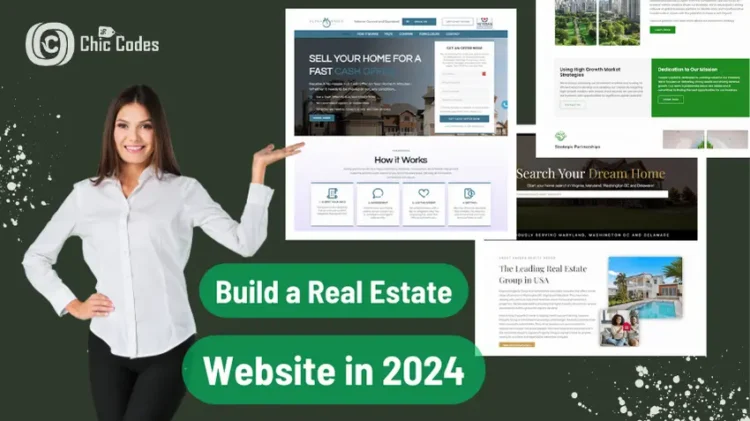Unlock the secrets of success in real estate website creation. This comprehensive guide covers audience understanding, SEO mastery, and captivating design. Build a real estate website that stands out now.
Table of Contents
How to Build a Real Estate Website
Introduction
In a world where everything is just a click away, the significance of a well-designed real estate website, or, more precisely, the imperative to build a real estate website, cannot be overstated. As the real estate industry embraces digital transformation, having an online platform is not just an option; it’s a necessity. In this article, we will explore the intricacies of creating a real estate website that stands out in the vast digital landscape.
Understanding Your Audience
Before delving into the technical aspects of website creation, it’s crucial to understand who your audience is. Are you catering to first-time homebuyers, commercial property investors, or renters? Tailoring your content and design to meet the expectations of your target audience is the first step towards a successful real estate website.
Choosing a Domain and Hosting
The foundation of any successful website lies in its domain name and hosting. Opt for a domain name that is not only easy to remember but also reflects the nature of your real estate business. Additionally, choose a reliable hosting service to ensure that your website is always accessible, providing visitors with a seamless browsing experience.
Design and User Experience
In the visually driven world of real estate, the design of your website plays a pivotal role. A visually appealing website with intuitive navigation can captivate visitors and encourage them to explore further. Consider hiring a professional web designer to create a layout that complements your brand and showcases your property listings effectively.
Responsive Design for Mobile Users
With the majority of users browsing on mobile devices, optimizing your real estate website for mobile is no longer a choice but a necessity. Ensure that your website has a responsive design that adapts to different screen sizes, providing a user-friendly experience for both desktop and mobile users.
Optimizing for Search Engines
To ensure that your real estate website gets noticed, implement effective SEO strategies. Conduct thorough keyword research related to your property listings and incorporate these keywords naturally into your content. This will improve your website’s visibility on search engine results pages, driving organic traffic to your platform.
Quality Content Creation
When it comes to real estate websites, content is king. Craft compelling property descriptions that highlight the unique features of each listing. Additionally, consider adding a blog section to share valuable insights about the real estate market, neighborhood highlights, and home improvement tips. High-quality images and multimedia content further enhance the overall user experience.
Integration of Virtual Tours
Incorporating virtual tours into your real estate website adds a dynamic element that can significantly impact the user experience. With advancements in technology, virtual tours allow potential buyers to explore properties from the comfort of their homes, offering a unique and immersive perspective.
Lead Capture Forms and Contact Information
Strategic placement of lead capture forms is essential for converting website visitors into potential clients. Ensure that these forms are easy to fill out and provide valuable information in return. Additionally, prominently display your contact information, making it simple for interested parties to get in touch with you.
Social Media Integration
Harness the power of social media to extend the reach of your real estate website. Integrate social sharing buttons on your property listings, allowing users to easily share their favorite homes with their network. Maintain an active presence on platforms like Instagram, Facebook, and Twitter to engage with your audience and showcase your property portfolio.
Security Measures
As your real estate website deals with sensitive information and transactions, prioritize security. Implement SSL certificates to encrypt data and provide a secure environment for users. Display trust badges and reassure visitors that their information is safe, fostering a sense of confidence in your platform.
Regular Updates and Maintenance
To keep your real estate website competitive, ensure that property listings, prices, and other information are regularly updated. An outdated website can deter potential clients and harm your reputation. Schedule routine maintenance to fix any bugs, optimize performance, and stay ahead in the dynamic real estate market.
Customer Testimonials and Reviews
Building trust is paramount in the real estate industry. Showcase positive customer testimonials and reviews on your website to instill confidence in potential clients. Encourage satisfied clients to share their experiences, creating a positive online reputation for your business.
Analyzing Website Metrics
Make informed decisions by regularly analyzing website metrics. Utilize tools like Google Analytics to track user behavior, website traffic, and engagement. Identify trends and areas for improvement, allowing you to make data-driven decisions to enhance the overall performance of your real estate website.
Build a Real Estate Website That Captivates and Converts
Conclusion
In the ever-evolving landscape of real estate, the digital realm is your gateway to success, and the key to that gateway is to build a real estate website that transcends expectations. As we conclude this comprehensive guide, it’s evident that crafting an impactful online presence goes beyond showcasing properties—it’s about creating an immersive experience for your audience.
In the realm of digital success, the phrase “Build a Real Estate Website” isn’t just a directive; it’s a promise. It’s a commitment to a journey of continuous improvement, adaptation to new technologies, and a dedication to meeting the evolving needs of your audience.
So, embark on this journey with confidence, armed with the knowledge and strategies outlined in this guide. Your real estate website isn’t just a URL; it’s your virtual showroom, your 24/7 sales representative, and the digital cornerstone of your success in the competitive real estate market.
Start building today. Your success story begins with those four words: Build a real estate website.
Frequently Asked Questions (FAQs)
- How much does it cost to build a real estate website?
- Building a real estate website’s cost varies based on features and complexity. Expect to invest anywhere from a few hundred to several thousand dollars.
- How do I choose the right platform for building my real estate website?
- Choosing the right platform is crucial when you decide to build a real estate website. Consider factors such as customization options, scalability, and user-friendliness. Popular platforms like WordPress, Wix, and Squarespace offer different advantages, so choose the one that aligns with your specific needs and preferences.
- Is it essential to have a mobile-responsive real estate website?
- Absolutely! With the increasing use of mobile devices, having a responsive design ensures a positive user experience for a wider audience.
- How often should I update property listings on my website?
- Regular updates are crucial. Aim for real-time updates to provide accurate information to potential buyers and tenants.
- What security measures are necessary for a real estate website?
- Implement SSL certificates, secure payment gateways, and regularly update security protocols to protect user data.
- Why is social media integration important for real estate websites?
- Social media integration expands your reach, engages your audience, and allows for easy sharing of property listings.
- How can I encourage clients to leave reviews on my website?
- Offer incentives, provide excellent service, and make the review process simple. Happy clients are more likely to share their positive experiences.

















No Comments
Leave Comment